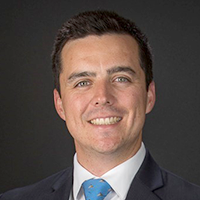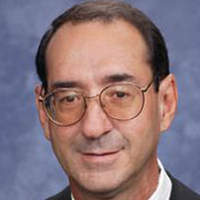
Tips from the Bench: Judge Roger Benitez

Clark Hill LLP
Judge Roger Benitez presides over Department 5A of United States Southern District Court in San Diego. Judge Benitez gives back to the San Diego legal community through his service on the board of directors for Thomas Jefferson School of Law. In addition to this, he was a member of De Anza Rescue Unit, an organization devoted to searching for and rescuing people lost or missing. He was also a member of the El Centro Planning Commission and was active in youth soccer and swimming organizations. He also served for nine years on the Judicial Conference Committee on Financial Disclosures, and now serves on the Judicial Panel for Multi District Litigation. Judge Benitez serves the San Diego community in more ways than one.
Judge Benitez is a Cuban immigrant who came to the United States through Operation Peter Pan. Operation Peter Pan only allowed children to come to the United States without their parents. These children had no idea whether they would ever see their parents again. Judge Benitez was 10 years old and only spoke Spanish when he was one of roughly 14,000 children who left Cuba in the clandestine operation to avoid growing up in Fidel Castro’s communist Cuba. He arrived in America with his brother in Miami, Florida. When his mother was allowed to immigrate, they all three moved to Emporia, Kansas after his mother received a scholarship to attend Kansas State Teachers College.

His family would later move to the Imperial Valley which became their home for decades. He lived in Calipatria, CA, and commuted to both college (San Diego State University) and law school (Western State College of Law; now Thomas Jefferson School of Law) from his home sometimes two to three days a week.
Judge Benitez’ grandfather was a lawyer in Cuba. He idolized how great of an orator his grandfather was and credits his grandfather as being part of his desire to become a lawyer.
After law school he entered private practice in the Imperial Valley and represented farmers, real estate clients, and credit unions across the country and abroad.
Three of Judge Benitez’ cases were published when he was in private practice. These cases are points of pride in his career as they show he has left his mark on the legal profession. The cases are Camacho v. Youde, (1979 95 Cal. App. 3d 163; A&M Produce Co. v. FMC Corp., (1982) 135 Cal.App.3d 473, and Valdez v. Smith, (1985) 166 Cal.App.3d 723.
Career as a Judge
Judge Benitez had the opportunity to become a judge while living in Imperial County. A Superior Court judge in the county called and encouraged Judge Benitez to run for the bench position once the judge retired. Judge Benitez ran for the position but was unsuccessful in this first attempt.
Later, Governor Wilson offered Judge Benitez a seat on the bench of the state court. After the initial appointment expired, he then had to run in a general election. Judge Benitez ran unopposed for the judgeship and was reelected to the position. By winning the election he felt the community valued his service as a judge. He served on the Superior Court in Imperial County for three and a half years.
Judge Benitez became a full-time Magistrate Judge because the Federal Court decided to open a full time Magistrate Judge Position in Imperial County. Prior to this there was a part-time Magistrate Judge position which did limited work. The full-time position would handle all cases, criminal and civil.
He was involved and participated in the design of the U.S. Courthouse in El Centro. Having a more traditionalist style choice, he insisted the courthouse have pillars as part of the entry as this design feature has historically signified to those who entered they were at this courthouse to conduct serious business.
Thirty days before he was to begin his position as a Magistrate Judge in the courthouse he helped designed, Judge Benitez was appointed by President George W. Bush to the open Southern District Federal District Court Judge position. He was honored by the appointment to the District Court but was somewhat disappointed he could not serve in his home of Imperial County. Judge Benitez would eventually get the opportunity to preside over the court in El Centro when he was asked to cover hearings for a judge.
Second Amendment Cases
Judge Benitez presides over four important cases which have shaped the Second Amendment: Duncan v. Bonta (S.D. Cal., Case No. 17-cv-01017), Miller v. Bonta (S.D. Cal., Case No. 19-cv-1537), Rhode v. Bonta (S.D. Cal., Case No. 18-cv-00802), and Fouts v. Bonta (S.D. Cal., Case No. 19-cv-01662). These cases have called upon him to interpret and apply the law as he understands the United States Supreme Court has said the law should be applied. While he was a hunter early in his life, he is not a gun enthusiast. Instead, he considers himself a better judicial colleague.
Under the Related Case Rule (F.R.C.P. 42), a rule that is used in almost every district in the country, a district court judge may transfer a case of similar subject matter to a judge within the same district to another judge by agreement to avoid unnecessary cost or delay. Judge Benitez presided over the first of the four cases dealing with the Second Amendment presented in the Southern District. In an effort to save judicial resources the other three cases were transferred to his department by agreement between the judges. This way only one judge had to spend the immense amount of time learning the case law concerning the Second Amendment.
The Second Amendment has presented Judge Benitez difficult issues as the law changes rapidly (most recently when the U.S. Supreme Court issued their decision in New York State Rifle & Pistol Association, Inc. v. Bruen, (2022) 597 U.S. 1). Most of the four cases before Judge Benitez have come back on remand for further evaluation under the new case law.
Criminal Case Turmoil
The cases which have been the most difficult for Judge Benitez to cope with are criminal cases. These are cases where he is required by law (such as mandatory minimum sentencing requirements) to often deprive a U.S. Citizen of their constitutional liberties. These cases are important to him as he has lived through a government depriving his family of their personal liberties.
Judge Benitez jealously guards the U.S. Constitution when government tries to overreach. He does this because very few people have lived to see a government shut down a church for no reason, or take someone’s business, or arrest someone without cause, or search a home without a warrant, or take land from an owner without just compensation. Judge Benitez has lived all these things as they have happened to him and more than one member of his family while living in Cuba.
Taking away someone’s constitutional rights is a decision Judge Benitez does not make with ease. He does the best he can as a District Court Judge to protect the liberties granted by U.S. Constitution to preserve them for future generations.
Advice to Reach the Bench
The Federal Court vets attorneys to be Magistrate Judges. In doing so they look to your work product, your reputation in the community, relevant practice experience, and your reputation. Judge Benitez recommends attorneys looking to become federal judges work to build connections through the Federal Bar Association, the San Diego County Bar Association, and other professional and civic organizations.
Advice to New Attorneys
Judge Benitez’ advice to new attorneys is to be prepared, do your research, be selective of the hills you fight over, do not burn bridges, and be civil. Simple concepts which are sometimes overlooked by attorneys working to be the best advocates they can be. Judge Benitez wants to remind new attorneys to remember these quotes as they embark on their practice of law:
“There are more instances of the abridgment of the freedom of the people by gradual and silent encroachments of those in power than by violent and sudden usurpation.”
-James Madison
“Those who are most likely to take freedom for granted are those who never lost it.”
– Unknown